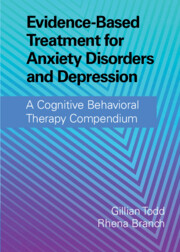 Evidence-Based Treatment for Anxiety Disorders and Depression
Evidence-Based Treatment for Anxiety Disorders and Depression from Part Four - Cognitive Behavioral Therapy for Depression
Published online by Cambridge University Press: 06 January 2022
Rumination and worry are characteristic mental processes within depression and anxiety that have been found to contribute to the onset and maintenance of multiple disorders and to interfere with effective recovery. As such, they are important targets for treatment and prevention. Cognitive behavioral therapy (CBT) has been adapted to specifically target rumination and worry, building on experimental research. This rumination-focused CBT has been proven to be efficacious in clinical trials. Rumination-focused CBT is based on the ideas that (1) rumination is a learnt habit and that effective treatment requires recognition of the triggers for the habit and either their removal/interruption or the learning of new adaptive responses to the triggers, based on repeated practice and if-then plans, and that (2) thinking over difficult situations is a normal response that can be helpful or unhelpful, and the therapy works with clients to shift them into a more helpful, concrete (How?) way of thinking rather than an unhelpful, abstract (Why?) way of thinking. The current chapter outlines the key principles, structure, and techniques within rumination-focused CBT including functional analysis, formulation, shifting thinking style, absorption, compassion, how to conduct assessments, how to select treatment components, and how to handle problems.
To save this book to your Kindle, first ensure [email protected] is added to your Approved Personal Document E-mail List under your Personal Document Settings on the Manage Your Content and Devices page of your Amazon account. Then enter the ‘name’ part of your Kindle email address below. Find out more about saving to your Kindle.
Note you can select to save to either the @free.kindle.com or @kindle.com variations. ‘@free.kindle.com’ emails are free but can only be saved to your device when it is connected to wi-fi. ‘@kindle.com’ emails can be delivered even when you are not connected to wi-fi, but note that service fees apply.
Find out more about the Kindle Personal Document Service.
To save content items to your account, please confirm that you agree to abide by our usage policies. If this is the first time you use this feature, you will be asked to authorise Cambridge Core to connect with your account. Find out more about saving content to Dropbox.
To save content items to your account, please confirm that you agree to abide by our usage policies. If this is the first time you use this feature, you will be asked to authorise Cambridge Core to connect with your account. Find out more about saving content to Google Drive.